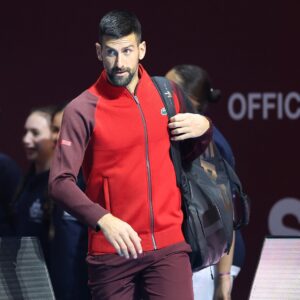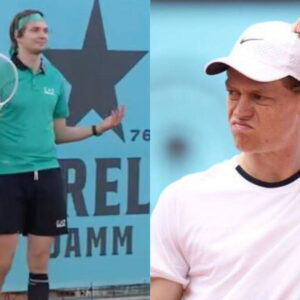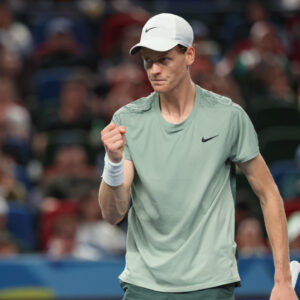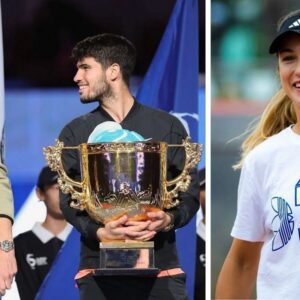The One That Got Away. It’s one of the oldest themes in the book, and we’re not talking about The Angler’s Digest. Everyone seems to have experienced an unexpected, perhaps even undeserved loss that still inspires regret. It could be a job, a romantic partner, an investment opportunity, a … well, a fish. Or a critical tennis match.
Over the coming days, Tennis.com will revisit the most surprising, significant defeats suffered by three iconic tennis stars: Rafael Nadal, Roger Federer and Novak Djokovic.
2021 US Open Final
Daniil Medvedev d, Novak Djokovic, 6-4, 6-4, 6-4, in 2:16
- Age: Djokovic, 34; Medevdev, 25
- Major Titles: Djokovic, 20; Medvedev 0
- Major Final Meetings: Djokovic led, 1-0
- All Meetings: Djokovic led, 5-3

This was not just another major final: nobody – not Federer, not Nadal, not Sampras, Agassi, McEnroe, Connors or Borg – had ever been in the same shoes.
© AFP via Getty Images
Novak Djokovic’s bid to record the first calendar year Grand Slam in men’s tennis in more than half-a-century was a gut-wrenching event flushed through with irony. That Djokovic was the loser in the most significant match of his career was just the start.
Bidding to become the first man since Rod Laver in 1969—and just the third man since Don Budge way back in 1938— to sweep the Grand Slam singles titles at all four majors, Djokovic was beaten by a cerebral, whippet-lean, 6-foot-6 Russian who was the loser in his only previous Grand Slam final.
Ironically, Djokovic was not outdone by either of his great career rivals in tennis’s Big 3, Roger Federer and Rafael Nadal, with whom Djokovic was deadlocked at 20 major wins apiece. Those two other stalwarts, with whom Djokovic had clashed so often in critical Grand Slam finals, missed the tournament due to injury.
Most surprisingly, Djokovic’s career-long effort to win the hearts and minds of tennis fans besotted with “Fedal” succeeded—perhaps too well. He was so moved by an outpouring of support when his chances were evaporating that his competitive drive faltered. The man who had become legendary for his stamina and unrelenting determination to grind down opponents was overwhelmed, his nerves fried.
But Djokovic’s history and transactions with the crowd were not the only reasons he was unable to keep a steady hand. Medvedev was able to bring his A-game to the match, and that had paid off for him on three previous occasions against Djokovic—albeit never on the big stage of a Grand Slam event.

Djokovic earned his revenge two years later at the 2023 US Open Final, though he was no longer eligible for the Calendar Slam.
© Getty Images
And then there was the elephant in the room: the glare of a spotlight that fell on Djokovic from the moment he arrived in New York, the pressure and expectations increasing on Djokovic with each step that brought him closer to the coveted prize. This was not just another major final: nobody—not Federer, not Nadal, not Sampras, Agassi, McEnroe, Connors or Borg—had ever been in the same shoes.
At Wimbledon that July, Djokovic had bragged about spending much time in the mountains, with wolves, which gave him “wolf energy.” He said that helped propel him on the way to his third Grand Slam title of the year. But just as the stars were aligning, the Serbian star made a hash out of his quest in Tokyo for his first Olympic singles gold medal. He was beaten by Alexander Zverev, after which Djokovic took nearly a month off—was it to commune again with the Carpathian wolves?—before reappearing in New York.
The launch of Djokovic’s drive was ominous. He was subjected to jeering during his first-round match against ATP newcomer Holger Rune. As the crowd chanted “Roon, Roon, Roon,” Djokovic thought they were booing him. When he figured out that were calling out Rune’s name, he decided it was just disrespectful.
After winning, Djokovic told reporters, “Obviously you always wish to have the crowd behind you, but it’s not always possible. That’s all I can say.”
The theme of crowd support—or lack thereof—was firmly established early in the event.
The stress Djokovic was under was manifest in his next five matches. He lost the first set in three consecutive matches starting with his third-round win over Kei Nishikori. But he patiently worked through his nerves and found his rhythm. His win over Zverev in a semifinal that went the five-set distance was a clear-the-decks moment, given what had happened a few weeks earlier in Tokyo. Djokovic appeared ready to embrace his destiny.
Was Djokovic lucky to get Medvedev instead of a proven Grand Slam champion in the final? That’s a difficult question to answer. A more relevant one might have been whether or not it was advantageous for Djokovic to come up against a player equally comfortable playing (like Djokovic) mainly from the backcourt, but one who also brought a dangerous blend of power, creativity, and stroking variety that Djokovic’s straightforward game could be hard put to match.
Medvedev was off to the races from the get-go in the match, breaking Djokovic’s serve in the very first game. He then raced through the first set. No matter, some thought, Djokovic had been starting slowly all tournament. Djokovic promptly had break points in Medvedev’s first service game of the second set, but they slipped away—as did another break point two games later. Failing to break Medvedev, Djokovic then smashed his own racquet in a surprising show of impatience—and stress.
The crowd, which had been urging and willing Djokovic to remain in contention—chanting his name, leaping to their feet when he smacked a winner—turned on him briefly then, showering him with boos.

As he sat on the changeover, absorbing the atmosphere, he began to tremble, and soon tears rolled down his cheeks, leading him to bury his face in his towel…
© AFP via Getty Images
In stark contrast to Djokovic, Medvedev remained poised and methodical in the ensuing games. He soon logged a break and finished off the set. Medvedev kept his foot on the gas through the third set, capitalizing on a break of Djokovic’s serve in the first game. Medvedev built his lead to 5-2, and didn’t flinch until he arrived at match point—whereupon he double-faulted twice and muffed a forehand to give up the game. The sudden prospect of a Djokovic resurgence had the crowd in a frenzy that peaked when he held for 4-5.
But Djokovic could not hold his emotions in check. As he sat on the changeover, absorbing the atmosphere, he began to tremble, and soon tears rolled down his cheeks, leading him to bury his face in his towel. He was spent, overcome, unable to focus. The breathtaking prize on offer no longer seemed to be the most important thing on earth. Although he managed to rein in his emotions in the next game, Medvedev survived two brutal rallies and won the match—and shattered a dream—on a service-return error by Djokovic.
Granted, Djokovic was feeling the pressure and unable to find his A-game for lengthy periods in the match. Still, Medvedev smacked 16 aces, or 5-plus per set (by contrast, Djokovic tagged just 6 in total). Medvedev hit 11 more winners and made six fewer unforced errors than Djokovic, and converted an outstanding 58 percent of his second-serve points—against the best returner in tennis.
“He was hitting his spots very well,” Djokovic acknowledged. “Not just aces.”
![“My heart is filled with joy, and I am the happiest man alive because you guys made me feel that way on the court. I never felt like this [before]," Djokovic said.](https://images.tennis.com/image/private/t_16-9_768/f_auto/tenniscom-prd/tvksd6v1debiq1djfgkg.jpg)
“My heart is filled with joy, and I am the happiest man alive because you guys made me feel that way on the court. I never felt like this [before],” Djokovic said.
© Getty Images
But in the end, the human element overshadowed the coronation of the game’s newest Grand Slam singles champion. Djokovic was so deeply affected by the crowd’s support that, after the customary hat tip to Medvedev in the post-match interview, he told the crowd: “My heart is filled with joy, and I am the happiest man alive because you guys made me feel that way on the court. I never felt like this [before].”
It was a transcendent moment, delivered by a man whose game on that day was anything but.
Honorable Mention: Last year, Djokovic lost a memorable, five-set Wimbledon final to 20-year old Carlos Alcaraz, 1-6, 7-6 (8), 6-1, 3-6, 6-4, halting Djokovic’s bid for a three-peat. Sure, the all-time Grand Slam singles champion suffered other unexpected and/or hotly contested matches, but this one is worth commemorating for its strong, end-of-an-era vibe. It represents the inevitable demise of a great warrior.





